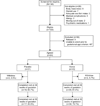Association between fatty acid supplementation and prenatal stress in African Americans: a randomized controlled trial
- PMID: 25415158
- PMCID: PMC4241554
- DOI: 10.1097/AOG.0000000000000559
Association between fatty acid supplementation and prenatal stress in African Americans: a randomized controlled trial
Abstract
Objective: To test the association between docosahexaenoic acid (DHA) supplementation and perceived stress and cortisol response to a stressor during pregnancy in a sample of African American women living in low-income environments.
Methods: Sixty-four African American women were enrolled at 16-21 weeks of gestation. Power calculations were computed using published standard deviations for the Perceived Stress Scale and the Trier Social Stress Test. Participants were randomized to either 450 mg per day of DHA (n=43) or placebo (n=21). At baseline and at 24 and 30 weeks of gestation, perceived stress was assessed by self-report. Cortisol response to a controlled stressor, the Trier Social Stress Test was measured from saliva samples collected upon arrival to the laboratory and after the completion of the Trier Social Stress Test.
Results: Women in the DHA supplementation group reported lower levels of perceived stress at 30 weeks of gestation, controlling for depression and negative life events (mean 27.4 compared with 29.5, F [3, 47] 5.06, P=.029, Cohen's d=0.65). Women in the DHA supplementation had lower cortisol output in response to arriving to the laboratory and a more modulated response to the stressor (F [1.78, 83.85] 6.24, P=.004, Cohen's d=0.76).
Conclusion: Pregnant women living in urban low-income environments who received DHA reported reduced perceived stress and lower levels of stress hormones in the third trimester. Docosahexaenoic acid supplementation may be a method for attenuating the effects of maternal stress during late pregnancy and improving the uterine environment with regard to fetal exposure to glucocorticoids.
Clinical trial registration: ClinicalTrials.gov, www.clinicaltrials.gov, NCT01158976.
Conflict of interest statement
Figures




References
-
- Barker DJ. Intrauterine programming of adult disease. Mol Med Today. 1995;1:418–423. - PubMed
-
- Schneider ML, Moore CF, Kraemer GW, Roberts AD, DeJesus OT. The impact of prenatal stress, fetal alcohol exposure, or both on development: Perspectives from a primate model. Psychoneuroendocrinology. 2002;27:285–298. - PubMed
-
- Chapillon P, Patin V, Roy V, Vincent A, Caston J. Effects of pre-and postnatal stimulation on developmental, emotional, and cognitive aspects in rodents: A review. Devel Psychobiol. 2002;41:373–387. - PubMed
-
- Coe CL, Lulbach GR, Schneider ML. Prenatal disturbance alters the size of the corpus callosum in young monkeys. Devel Psychol. 2002;41:178–185. - PubMed
Publication types
MeSH terms
Substances
Associated data
Grants and funding
LinkOut - more resources
Full Text Sources
Other Literature Sources
Medical

